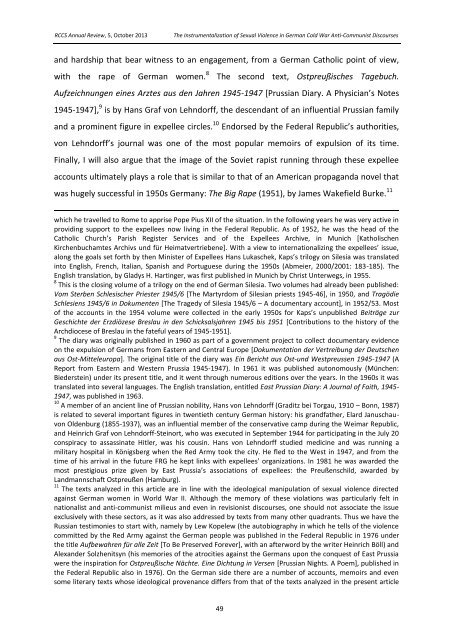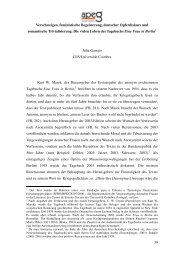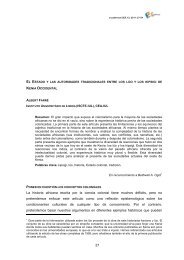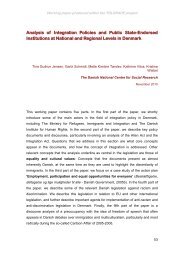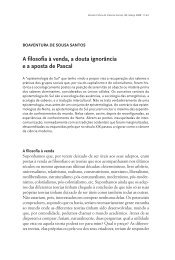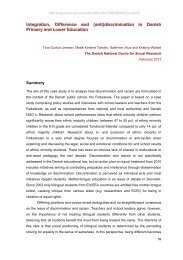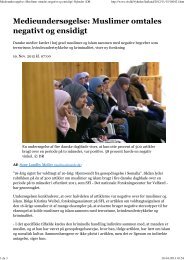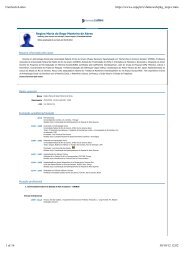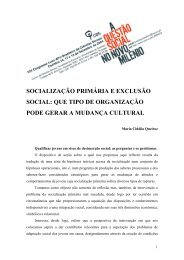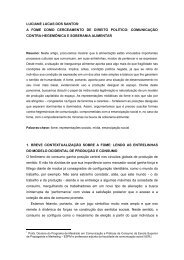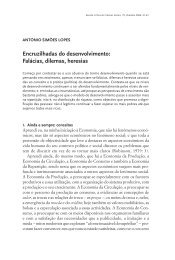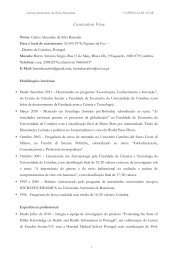The Instrumentalization of Sexual Violence in German Cold War Anti ...
The Instrumentalization of Sexual Violence in German Cold War Anti ...
The Instrumentalization of Sexual Violence in German Cold War Anti ...
You also want an ePaper? Increase the reach of your titles
YUMPU automatically turns print PDFs into web optimized ePapers that Google loves.
RCCS Annual Review, 5, October 2013<br />
<strong>The</strong> <strong>Instrumentalization</strong> <strong>of</strong> <strong>Sexual</strong> <strong>Violence</strong> <strong>in</strong> <strong>German</strong> <strong>Cold</strong> <strong>War</strong> <strong>Anti</strong>-Communist Discourses<br />
and hardship that bear witness to an engagement, from a <strong>German</strong> Catholic po<strong>in</strong>t <strong>of</strong> view,<br />
with the rape <strong>of</strong> <strong>German</strong> women. 8 <strong>The</strong> second text, Ostpreußisches Tagebuch.<br />
Aufzeichnungen e<strong>in</strong>es Arztes aus den Jahren 1945-1947 [Prussian Diary. A Physician’s Notes<br />
1945-1947], 9 is by Hans Graf von Lehndorff, the descendant <strong>of</strong> an <strong>in</strong>fluential Prussian family<br />
and a prom<strong>in</strong>ent figure <strong>in</strong> expellee circles. 10 Endorsed by the Federal Republic’s authorities,<br />
von Lehndorff’s journal was one <strong>of</strong> the most popular memoirs <strong>of</strong> expulsion <strong>of</strong> its time.<br />
F<strong>in</strong>ally, I will also argue that the image <strong>of</strong> the Soviet rapist runn<strong>in</strong>g through these expellee<br />
accounts ultimately plays a role that is similar to that <strong>of</strong> an American propaganda novel that<br />
was hugely successful <strong>in</strong> 1950s <strong>German</strong>y: <strong>The</strong> Big Rape (1951), by James Wakefield Burke. 11<br />
which he travelled to Rome to apprise Pope Pius XII <strong>of</strong> the situation. In the follow<strong>in</strong>g years he was very active <strong>in</strong><br />
provid<strong>in</strong>g support to the expellees now liv<strong>in</strong>g <strong>in</strong> the Federal Republic. As <strong>of</strong> 1952, he was the head <strong>of</strong> the<br />
Catholic Church’s Parish Register Services and <strong>of</strong> the Expellees Archive, <strong>in</strong> Munich [Katholischen<br />
Kirchenbuchamtes Archivs und für Heimatvertriebene]. With a view to <strong>in</strong>ternationaliz<strong>in</strong>g the expellees’ issue,<br />
along the goals set forth by then M<strong>in</strong>ister <strong>of</strong> Expellees Hans Lukaschek, Kaps’s trilogy on Silesia was translated<br />
<strong>in</strong>to English, French, Italian, Spanish and Portuguese dur<strong>in</strong>g the 1950s (Abmeier, 2000/2001: 183-185). <strong>The</strong><br />
English translation, by Gladys H. Hart<strong>in</strong>ger, was first published <strong>in</strong> Munich by Christ Unterwegs, <strong>in</strong> 1955.<br />
8 This is the clos<strong>in</strong>g volume <strong>of</strong> a trilogy on the end <strong>of</strong> <strong>German</strong> Silesia. Two volumes had already been published:<br />
Vom Sterben Schlesischer Priester 1945/6 [<strong>The</strong> Martyrdom <strong>of</strong> Silesian priests 1945-46], <strong>in</strong> 1950, and Tragödie<br />
Schlesiens 1945/6 <strong>in</strong> Dokumenten [<strong>The</strong> Tragedy <strong>of</strong> Silesia 1945/6 – A documentary account], <strong>in</strong> 1952/53. Most<br />
<strong>of</strong> the accounts <strong>in</strong> the 1954 volume were collected <strong>in</strong> the early 1950s for Kaps’s unpublished Beiträge zur<br />
Geschichte der Erzdiözese Breslau <strong>in</strong> den Schicksalsjahren 1945 bis 1951 [Contributions to the history <strong>of</strong> the<br />
Archdiocese <strong>of</strong> Breslau <strong>in</strong> the fateful years <strong>of</strong> 1945-1951].<br />
9 <strong>The</strong> diary was orig<strong>in</strong>ally published <strong>in</strong> 1960 as part <strong>of</strong> a government project to collect documentary evidence<br />
on the expulsion <strong>of</strong> <strong>German</strong>s from Eastern and Central Europe [Dokumentation der Vertreibung der Deutschen<br />
aus Ost-Mitteleuropa]. <strong>The</strong> orig<strong>in</strong>al title <strong>of</strong> the diary was E<strong>in</strong> Bericht aus Ost-und Westpreussen 1945-1947 (A<br />
Report from Eastern and Western Prussia 1945-1947). In 1961 it was published autonomously (München:<br />
Biederste<strong>in</strong>) under its present title, and it went through numerous editions over the years. In the 1960s it was<br />
translated <strong>in</strong>to several languages. <strong>The</strong> English translation, entitled East Prussian Diary: A Journal <strong>of</strong> Faith, 1945-<br />
1947, was published <strong>in</strong> 1963.<br />
10 A member <strong>of</strong> an ancient l<strong>in</strong>e <strong>of</strong> Prussian nobility, Hans von Lehndorff (Graditz bei Torgau, 1910 – Bonn, 1987)<br />
is related to several important figures <strong>in</strong> twentieth century <strong>German</strong> history: his grandfather, Elard Januschauvon<br />
Oldenburg (1855-1937), was an <strong>in</strong>fluential member <strong>of</strong> the conservative camp dur<strong>in</strong>g the Weimar Republic,<br />
and He<strong>in</strong>rich Graf von Lehndorff-Ste<strong>in</strong>ort, who was executed <strong>in</strong> September 1944 for participat<strong>in</strong>g <strong>in</strong> the July 20<br />
conspiracy to assass<strong>in</strong>ate Hitler, was his cous<strong>in</strong>. Hans von Lehndorff studied medic<strong>in</strong>e and was runn<strong>in</strong>g a<br />
military hospital <strong>in</strong> Königsberg when the Red Army took the city. He fled to the West <strong>in</strong> 1947, and from the<br />
time <strong>of</strong> his arrival <strong>in</strong> the future FRG he kept l<strong>in</strong>ks with expellees’ organizations. In 1981 he was awarded the<br />
most prestigious prize given by East Prussia’s associations <strong>of</strong> expellees: the Preußenschild, awarded by<br />
Landmannschaft Ostpreußen (Hamburg).<br />
11 <strong>The</strong> texts analyzed <strong>in</strong> this article are <strong>in</strong> l<strong>in</strong>e with the ideological manipulation <strong>of</strong> sexual violence directed<br />
aga<strong>in</strong>st <strong>German</strong> women <strong>in</strong> World <strong>War</strong> II. Although the memory <strong>of</strong> these violations was particularly felt <strong>in</strong><br />
nationalist and anti-communist milieus and even <strong>in</strong> revisionist discourses, one should not associate the issue<br />
exclusively with these sectors, as it was also addressed by texts from many other quadrants. Thus we have the<br />
Russian testimonies to start with, namely by Lew Kopelew (the autobiography <strong>in</strong> which he tells <strong>of</strong> the violence<br />
committed by the Red Army aga<strong>in</strong>st the <strong>German</strong> people was published <strong>in</strong> the Federal Republic <strong>in</strong> 1976 under<br />
the title Aufbewahren für alle Zeit [To Be Preserved Forever], with an afterword by the writer He<strong>in</strong>rich Böll) and<br />
Alexander Solzhenitsyn (his memories <strong>of</strong> the atrocities aga<strong>in</strong>st the <strong>German</strong>s upon the conquest <strong>of</strong> East Prussia<br />
were the <strong>in</strong>spiration for Ostpreußische Nächte. E<strong>in</strong>e Dichtung <strong>in</strong> Versen [Prussian Nights. A Poem], published <strong>in</strong><br />
the Federal Republic also <strong>in</strong> 1976). On the <strong>German</strong> side there are a number <strong>of</strong> accounts, memoirs and even<br />
some literary texts whose ideological provenance differs from that <strong>of</strong> the texts analyzed <strong>in</strong> the present article<br />
49


